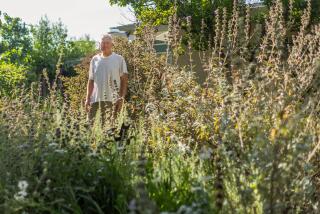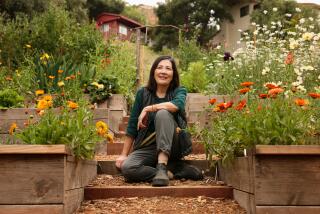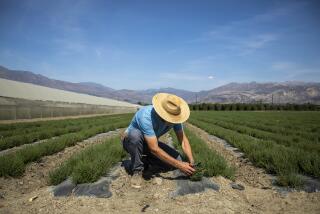‘Cheap Farming’ the Way to Go for 73-Year-Old Apricot Grower
- Share via
Ask K.B. (Pete) Hall to expound on the wisdom and science of organic farming, and he’ll likely say horse manure.
“We don’t call it organic, we call it cheap farming,” he said on a recent walk through his apricot orchard above Ojai.
Hall, 73, has been growing apricots without chemical pesticides and fertilizers since 1955 when he bought the 42-acre ranch. But he doesn’t blow the horn for the organic movement. Nor does he steep himself in the emerging science of growing organically. His approach is more casual than that.
He pointed to an impressive mound of horse manure in the field. Collected from a nearby horse ranch, it’s the only additive that goes into his ground.
“We don’t use anything--that’s why we call it cheap farming,” he said. “We’re poor old farmers. We can’t afford to buy those chemical fertilizers,” he said with a smile.
Hall’s 700 trees may be the oldest naturally grown spread in the county. A sign at the ranch proclaims the apricots have been grown that way since 1906 when the trees were planted by a previous owner.
Hall is a burly, likable guy who wears blue overalls. When he bought the ranch 35 years ago, he was a geologist for an oil company in Ojai. The ranch, built in the 1840s, was barely livable.
“It had a wood stove and a spigot coming out of the wall,” he said. “We heated our water on the wood stove.”
It was on the farm that he and his wife, Emily, one of the first female Episcopal priests in California, raised seven sons, all named after biblical figures.
He quit the oil company in 1966 when he was asked to transfer to Los Angeles. He turned his efforts to farming and did oil consulting work on the side. It was his wife who steered him toward natural foods.
“She’s a health nut,” he said. Plagued with allergies, she has always searched out the purest foods to alleviate her symptoms. At one time the ranch included goats, and the children were raised on goat’s milk because she believed it to be healthier than cow’s milk.
Hall said he doesn’t believe in going overboard, but he eats whole wheat bread. “I sort of go along with the idea.”
He hawks the apricots at a roadside stand in front of the ranch. He sells them at farmers markets and to health food store distributors. Every year he ships 40 pounds of them to a wealthy Frenchman who claims they are the best in the world.
“It’s really just a family deal--we’re not big operators,” he said. One son runs a tractor for him when the ground needs work, others help harvest, dry and package the fruit. He and his wife moved to Santa Paula four years ago and a couple of his sons are still living at the ranch.
His philosophy of farming is more passive than active, a fact that probably bewilders other organic growers who tirelessly pamper the soil with whatever organic products they can find.
He takes a more natural view. He opposes chemical pesticides and fertilizers because they lower the soil’s own natural resistance to fight disease and pests. The soil can take better care of itself without them, or much of anything else, he said.
“That’s what everyone is finding out with this big environmental thing,” he said. “If you upset the balance of nature, you’re killing off the good bugs and the bad ones.”
Hall could probably get a bigger crop if he irrigated his ground and used the chemicals. His fruit would be totally unblemished and without any worms.
“That’s the problem, people are used to perfection,” he said. “Would you rather eat a worm or pesticides?”
More to Read
Sign up for Essential California
The most important California stories and recommendations in your inbox every morning.
You may occasionally receive promotional content from the Los Angeles Times.










